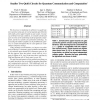Free Online Productivity Tools
i2Speak
i2Symbol
i2OCR
iTex2Img
iWeb2Print
iWeb2Shot
i2Type
iPdf2Split
iPdf2Merge
i2Bopomofo
i2Arabic
i2Style
i2Image
i2PDF
iLatex2Rtf
Sci2ools
DATE
2004
IEEE
2004
IEEE
Smaller Two-Qubit Circuits for Quantum Communication and Computation
We show how to implement an arbitrary two-qubit unitary operation using any of several quantum gate libraries with small a priori upper bounds on gate counts. In analogy to library-less logic synthesis, we consider circuits and gates in terms of the underlying model of quantum computation, and do not assume any particular technology. As increasing the number of qubits can be prohibitively expensive, we assume throughout that no extra qubits are available for temporary storage. Using quantum circuit identities, we improve an earlier lower bound of 17 elementary gates by Bullock and Markov to 18, and their upper bound of 23 elementary gates to 18. We also improve upon the generic circuit with six CNOT gates by Zhang et al. (our circuit uses three), and that by Vidal and Dawson with 11 basic gates (we use 10). We study the performance of our synthesis procedures on two-qubit operators that are useful in quantum algorithms and communication protocols. With additional work, we find small c...
DATE 2004 | Elementary Gates | Hardware | Quantum | Upper Bound |
Related Content
| Added | 20 Aug 2010 |
| Updated | 20 Aug 2010 |
| Type | Conference |
| Year | 2004 |
| Where | DATE |
| Authors | Vivek V. Shende, Igor L. Markov, Stephen S. Bullock |
Comments (0)

